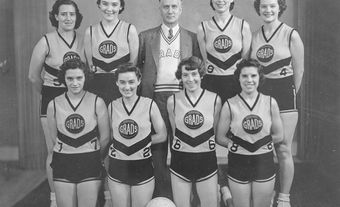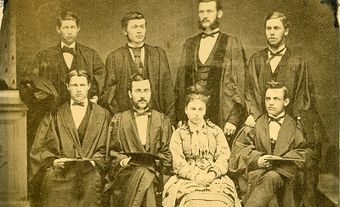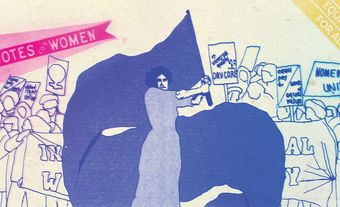Hilda Ada Marion Neatby, CC, historian, author, and educator (born 19 February 1904 in Sutton, United Kingdom; died 14 May 1975 in Saskatoon, Saskatchewan). Neatby was the first woman to lead a university history department in Canada and the first female president of the Canadian Historical Association (CHA). She was also the only woman to serve on the Massey Commission. In 1967, she was chosen as Saskatchewan’s Woman of the Century and became a Companion of the Order of Canada. Since 1982, the CHA has awarded the Hilda Neatby Prize for women’s history.

Family and Education
Hilda Neatby was the seventh of eight surviving children of Andrew and Ada Neatby. Andrew was a physician and Ada came from a medical family. In 1906, the Neatbys immigrated to Saskatchewan, settling first in the town of Earl Grey and then on a farm west of Watrous. Hilda later reminisced about her education in a 1960s biographical sketch, recalling, “My primary school education was received in the little school which served our rural district… My high school training was somewhat scrappy, carried out with the assistance of elementary school teachers and of course my parents, with the addition of one year at a collegiate institute in Saskatoon.” The Neatby home contained more than 3,000 books.
In 1919, the Neatby family moved to Saskatoon. Hilda worked as a rural schoolteacher in the summer of 1920, then enrolled at the University of Saskatchewan, graduating with a BA Honours degree in history in 1924. She was fluent in French and received a provincial government scholarship to study at the Sorbonne in Paris in 1924–25. Upon her return, she worked as a university instructor in French and history and attended graduate school, receiving an MA from the University of Saskatchewan in 1930 and a PhD from the University of Minnesota in 1934.
Personal Life
According to her sister Kate, Hilda Neatby received at least two marriage proposals but “neither apparently was tempting” and she remained unmarried. She was close to her siblings, nieces, and nephews. Hilda’s brother Kenneth Neatby was an agricultural scientist who discovered how to predict rust resistance in new wheat hybrids. Another brother, Leslie H. Neatby, was a teacher and author who wrote Chronicle of a Pioneer Prairie Family about the Neatbys in Saskatchewan.
Academic Career
After receiving her PhD, Hilda Neatby struggled to find academic employment. She wrote to Kate in 1933, “a Ph.D. in Canadian history is practically an unsalable article and when it is saddled with the wrong sex things are even worse.” From 1934 until 1946, Neatby was an instructor in history and French at a variety of secondary and post-secondary institutions, including Regina College (now the University of Regina) and the University of Toronto. Following the Second World War, university enrollment increased in Canada and Neatby joined the history faculty of the University of Saskatchewan.
Neatby had a long and distinguished academic career. She was the first editor of Saskatchewan History. In 1958, Neatby became Head of the History Department at the University of Saskatchewan, the first woman to become head of a university history department in Canada, a position she held until 1969. In 1962, she became the first woman to lead the Canadian Historical Association.
The Massey Commission
From 1949 to 1951, Hilda Neatby was the only female member of the Royal Commission on the National Development in the Arts and Letters and Sciences, better known as the Massey Commission, because it was chaired by future Governor General Vincent Massey. The commission recommended federal funding for arts and culture, universities, and the preservation of Canadian historic sites. Neatby was especially concerned with the preservation of historical documents. The recommendations of the Massey Commission prompted the founding of the National Library of Canada (now Libraries and Archives Canada) and the creation of the Canada Council for the Arts. Neatby continued to work closely with Massey after her time on the commission. During his term as Governor General from 1952 to 1959, she was one of his speechwriters.
So Little for the Mind
In 1953, Hilda Neatby published So Little For the Mind, a critique of the Canadian educational system. The book sparked public debate regarding the effectiveness of new trends in student centred education championed by John Dewey. Neatby was concerned that the new focus on directing children towards subjects that they could learn with little effort would turn them into “self centred little automatons.” She believed that students needed high standards and challenging tests to achieve their potential, writing, “Who is so bored and boring as a self-centred person? Who is so happy and so free as the one whose pleasures and interests reach outward?” So Little for the Mind sold nearly 18,000 copies by 1975 and Neatby becoming a well-known commentator on education issues in the media. In a 1953 CBC talk, she stated, “The confused array of qualities and activities, and evidences of goodness in teacher, school and community conceal the fact that in the face of equalitarianism and group activities individual standards of achievement slide away.”
Neatby’s ideas on education were shaped by her upbringing and strong Presbyterian faith. In a 1969 convocation address, she stated, “I was taught not self-expression but self-control, not confrontation but respect for my seniors, not to go after flower power or student power or sit-ins or live-ins but to do my duty.”
Quebec History
Hilda Neatby wrote extensively on the history of Quebec. Her doctoral dissertation analyzed the judicial system under the Quebec Act of 1774 until the passing of the Constitution Act of 1791. In 1972, she edited a volume in a series about Canadian historical controversies entitled, The Quebec Act: Protest and Policy. Neatby had strong views on the importance of Canadian history to nation building, writing in a 1951 article, “Canadian history which, properly understood, could help to develop in Canadians a sense of unity and of international understanding, has been used too long to stir up petty resentments against each other, against Great Britain and against the United States.”
Neatby was the only woman invited to write a volume of the Canada Centenary series, a 19-volume history of Canada from Viking exploration to the centennial of Confederation. The series was edited by William Lewis Morton and Donald Grant Creighton and published between 1963 and 1987. Neatby’s volume, Quebec: The Revolutionary Age 1760-1791, was published in French and English in 1966. It examined France’s decision to formally surrender Quebec to the British in the 1763 Treaty of Paris, and British actions after assuming control of French Canada, including how successive governors implemented the Quebec Act.
Awards and Accolades
In 1967, Hilda Neatby became a Companion of the Order of Canada and was chosen as Saskatchewan Woman of the Century. The University of Saskatchewan awarded her an honourary Doctor of Laws degree in 1971. She also received honourary doctorates from the University of New Brunswick, Brock University and the University of Toronto. The Hilda Neatby Prize for women’s history has been awarded by the Canadian Historical Association since 1982. In 2000, a portrait of Neatby appeared on a stamp with a background depicting a Saskatchewan prairie farm reminiscent of her childhood.
Later Life
In 1969, Hilda Neatby was offered a three-year appointment in the Department of History at Queen’s University at Kingston and began work on a history of Queen’s. Her book, Queen’s University, Volume 1, 1841-1917: And Not to Yield was published posthumously in 1978. Neatby died of cancer in 1975.

 Share on Facebook
Share on Facebook Share on X
Share on X Share by Email
Share by Email Share on Google Classroom
Share on Google Classroom




